Imagine a bard reaching for their instrument, seemingly about to buff a party member. Suddenly, an unnatural, dissonant melody echoes across the battlefield as the bard supports their comrade not with an inspiring tune, but via a chilling aria that speaks of long-dead specters!
Bards in the College of Spirits, a subclass introduced in Van Richten’s Guide to Ravenloft, are like leaders of a séance, weaving tales of creatures who have long since past from the Material Plane. When these singers open their mouths, spirits speak through them.
College of Spirits features
- Guiding Whispers: At 3rd level, when you join this college, you learn the Guidance cantrip and can cast it at a range of up to 60 feet. This increased range permits you to aid party members in situations you otherwise might be unable to, such as if they are scaling a cliff or are onstage putting on a performance. You can flavor this cantrip as you summoning a spirit to lend a hand.
- Spiritual Focus: You also receive a Spiritual Focus at 3rd level. This focus can take the form of a candle, crystal ball, ouija board, deck of tarokka cards, or a skull. The focus just adds flavor to this subclass until 6th level. At that level, when you cast a bard spell that deals damage or restores hit points through your Spiritual Focus, you can roll a d6 and add it to one roll of the spell.
- Tales from Beyond: The College of Spirits' bread and butter is the 3rd-level feature Tales from Beyond. As a bonus action, you can spend a Bardic Inspiration die to roll on the Spirit Tales table (shown below). Each tale has a different effect, ranging from teleporting targets to dealing psychic damage to enemies. You can retain one tale at a time and only until you either use the effect or finish a short or long rest. Using an action, you can bestow the tale’s effect on a target within 30 feet, including yourself. The tales are also prefaced with flavorful hooks that make for great roleplaying fuel. For instance, the psychic damage effect occurs when the bard orates a fable of an incomprehensible, mind-bending being. Perhaps the bard has communed with the deceased follower of an eldritch god from beyond the stars like Cthulhu!
Spirit Tales
| Tale Told Through You | Bardic Insp. Die |
| 1 | Tale of the Clever Animal. For the next 10 minutes, whenever the target makes an Intelligence, a Wisdom, or a Charisma check, the target can roll an extra die immediately after rolling the d20 and add the extra die’s number to the check. The extra die is the same type as your Bardic Inspiration die. |
| 2 | Tale of the Renowned Duelist. You make a melee spell attack against the target. On a hit, the target takes force damage equal to two rolls of your Bardic Inspiration die + your Charisma modifier. |
| 3 | Tale of the Beloved Friends. The target and another creature of its choice it can see within 5 feet of it gains temporary hit points equal to a roll of your Bardic Inspiration die + your Charisma modifier. |
| 4 | Tale of the Runaway. The target can immediately use its reaction to teleport up to 30 feet to an unoccupied space it can see. When the target teleports, it can choose a number of creatures it can see within 30 feet of it up to your Charisma modifier (minimum of 0) to immediately use the same reaction. |
| 5 | Tale of the Avenger. For 1 minute, any creature that hits the target with a melee attack takes force damage equal to a roll of your Bardic Inspiration die. |
| 6 | Tale of the Traveler. The target gains temporary hit points equal to a roll of your Bardic Inspiration die + your bard level. While it has these temporary hit points, the target’s walking speed increases by 10 feet and it gains a +1 bonus to its AC. |
| 7 | Tale of the Beguiler. The target must succeed on a Wisdom saving throw or take psychic damage equal to two rolls of your Bardic Inspiration die, and the target is incapacitated until the end of its next turn. |
| 8 | Tale of the Phantom. The target becomes invisible until the end of its next turn or until it hits a creature with an attack. If the target hits a creature with an attack during this invisibility, the creature it hits takes necrotic damage equal to a roll of your Bardic Inspiration die and is frightened of the target until the end of the frightened creature’s next turn. |
| 9 | Tale of the Brute. Each creature of the target’s choice it can see within 30 feet of it must make a Strength saving throw. On a failed save, a creature takes thunder damage equal to three rolls of your Bardic Inspiration die and is knocked prone. A creature that succeeds on its saving throw takes half as much damage and isn’t knocked prone. |
| 10 | Tale of the Dragon. The target spews fire from the mouth in a 30-foot cone. Each creature in that area must make a Dexterity saving throw, taking fire damage equal to four rolls of your Bardic Inspiration die on a failed save, or half as much damage on a successful one. |
| 11 | Tale of the Angel. The target regains hit points equal to two rolls of your Bardic Inspiration die + your Charisma modifier, and you end one condition from the following list affecting the target: blinded, deafened, paralyzed, petrified, or poisoned. |
| 12 | Tale of the Mind-Bender. You evoke an incomprehensible fable from an otherworldly being. The target must succeed on an Intelligence saving throw or take psychic damage equal to three rolls of your Bardic Inspiration die and be stunned until the end of its next turn. |
- Spirit Session: This 6th-level feature adds flexibility to the College of Spirits bard. Once per long rest, you can conduct an hour-long ritual with a number of creatures equal to your proficiency bonus (including yourself). Afterward, you temporarily learn a divination or necromancy spell from any class, and that spell counts as a bard spell. The spell level must be equal to the number of creatures who participated in the ritual, and be a spell level that you can cast. (Here is a complete list of spells you can learn.) The spell is retained until you take a long rest.
- Mystical Connection: At 14th level, College of Spirits bards gain more control over their Tales from Beyond. You can now roll a die twice when rolling on the Spirit Tales table, choosing which of the two effects to bestow. If you roll the same number twice, you can choose any effect!
Pros
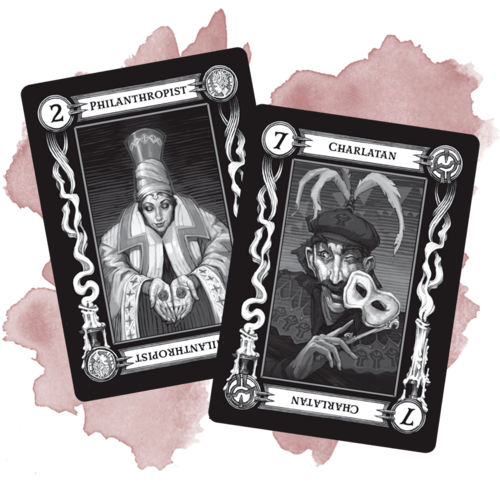 The College of Spirits offers much in the way of versatility and flavor, along with a healthy dose of randomness that will keep play interesting. Being able to cast Guidance at range is a fantastic means of supporting party members, and Tales from Beyond offers myriad opportunities for players to collaborate with their Dungeon Master on the appearance of a tale’s effect. For more flexibility, bards can even start the adventuring day by rolling on the Spirit Tales table and holding onto the rolled effect until they complete a short rest.
The College of Spirits offers much in the way of versatility and flavor, along with a healthy dose of randomness that will keep play interesting. Being able to cast Guidance at range is a fantastic means of supporting party members, and Tales from Beyond offers myriad opportunities for players to collaborate with their Dungeon Master on the appearance of a tale’s effect. For more flexibility, bards can even start the adventuring day by rolling on the Spirit Tales table and holding onto the rolled effect until they complete a short rest.
Spirit Session lets you access magic that you might otherwise skip when choosing spells. For instance, you can temporarily pick up spells such as Identify and Locate Object when it would benefit you. Your selection of spells that restore hit points is severely limited, but you do gain access to Revivify, which is a stellar option when you're anticipating combat.
Cons
Although Tales from Beyond has some great effects, the random nature of the Spirit Tales table might be off-putting to some players. The range of 30 feet could also require bards to wander closer to the fight in order to use each tale’s effect. Keep in mind, Bardic Inspiration has a range of 60 feet.
The big issue with the College of Spirits subclass, however, lies in the 6th-level Spiritual Focus feature. It specifies that you can only add a d6 to a spell that is cast through the focus. This means the spell must require material components. Spells such as Vicious Mockery and Healing Word won't benefit from this subclass feature as they only require verbal components.
Meet Knee-Knee, the Vistani-trained violinist
In the center of the misty forest crossroads was a campfire, bordered on all sides by brightly decorated wagons and dancing groups of traveling folk. These were the Vistani, and as they undulated their bodies to the tunes of lutes, tambourines, and violins, one figure seemed to stand out from the rest. Upon closer inspection, this figure wasn’t even human. It was a kenku, dressed in colorful Vistani garb, playing in sync with her companions.
Suddenly, the melody of the campfire took on a mysterious, dissonant tone. The kenku amplified this with several shrill vibrations of her violin strings, and as she did so, her pupils rolled backwards. A sinister voice emerged from her beak, telling the saga of a long-forgotten phantom. For a moment, it seemed as if this was no mere forest clearing, but a meeting ground for souls from the Ethereal Plane.
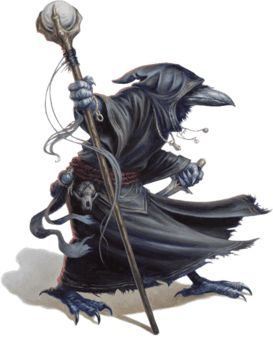 Knee-Knee is a chaotic neutral kenku and former burglar who got her name from the scars on her knees, which she obtained after taking a nasty fall during a getaway. Her life of crime came to an end when she tried stealing an instrument from a group of traveling Vistani. She was caught, but to her surprise the travelers welcomed her into their group, remarking that she reminded them of wereravens.
Knee-Knee is a chaotic neutral kenku and former burglar who got her name from the scars on her knees, which she obtained after taking a nasty fall during a getaway. Her life of crime came to an end when she tried stealing an instrument from a group of traveling Vistani. She was caught, but to her surprise the travelers welcomed her into their group, remarking that she reminded them of wereravens.
Knee-Knee found that the group of Vistani were kind, and that her Mimicry made her a talented musician. Eventually, a Vistani bard gifted Knee-Knee the instrument she had sought to steal. They told her it was called a violin. Enamored by the instrument because it made a high-pitched sound that reminded her of her name, Knee-Knee could soon emulate dozens of tunes merely by observing others play the violin. She also learned tales from spirits that she and her newfound family encountered during trips into a realm known as the Shadowfell. Before long, Knee-Knee made it her goal to collect as many sounds and stories as possible — from both the living and the nonliving.
Playing Knee-Knee
Knee-Knee is a chaotic neutral bard with the Criminal background. Her highest ability scores are in Charisma and Dexterity, while her Strength is below average. She has proficiency and Expertise in the following skills:
- Acrobatics
- Deception
- Perception
- Performance (Expertise)
- Persuasion
- Sleight of Hand
- Stealth (Expertise)
Due to her Mimicry and fondness for sounds, Knee-Knee favors spells with verbal components, such as Message, Vicious Mockery, Dissonant Whispers, and Healing Word. Magic Mouth is also one of her personal favorites, since the kenku derives great delight from transmitting the sounds she collects from various inanimate objects.
The stories that Knee-Knee’s adoptive Vistani family tell her of Shadowfell ghosts can be used to flavor the College of Spirits' Tales from Beyond feature. Knee-Knee also has plenty of volunteers for her daily Spirit Session, allowing her to access circumstantial spells that can aid others. For spells requiring material components, Knee-Knee will use a Vistani tarokka deck as her Spiritual Focus.
Considering her relationship with the only group that navigates the Mists between the Shadowfell’s Domains of Dread, Knee-Knee can make for an excellent companion in any party.
Sing to the Mists
Knee-knee is but one example character you can build as a College of Spirits bard. If you’ve ever been drawn to the mournful sound of minor chords or dreamed of changing the tide of battle with nightmarish medleys, look no further than this subclass. Just be wary of the spirits that speak through you!
Van Richten's Guide to Ravenloft is available to purchase on D&D Beyond! It offers two new subclasses, lineages, all-new monsters, and more! Master-tier subscribers can share content they purchase in the marketplace with players in their campaigns.
Jeremy Blum (@PixelGrotto) is a journalist, gaming blogger, comic book aficionado, and fan of all forms of storytelling who rolled his first polyhedral dice while living in Hong Kong in 2017. Since then, he's never looked back and loves roleplaying games for the chance to tell the tales that have been swirling in his head since childhood.








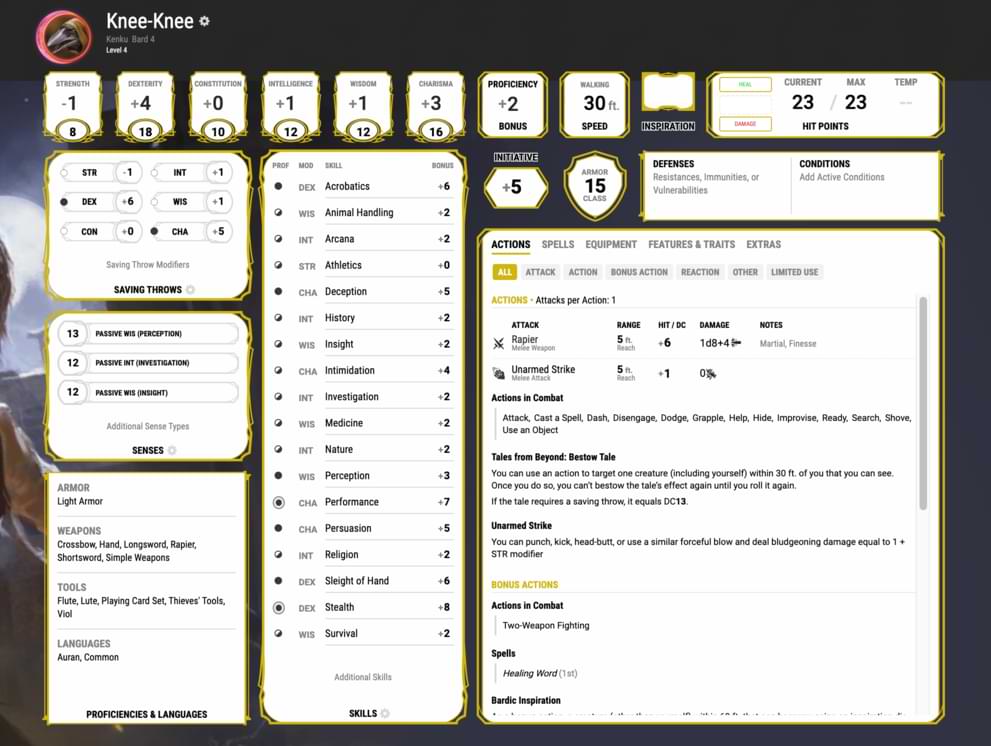
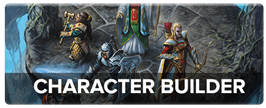
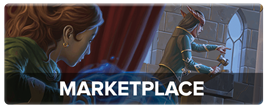

-
View User Profile
-
Send Message
Posted May 22, 2021in dnd beyond character class selector the spells for spirit session, there are non-divination and necromantic spells is healing spirit a part of it or is there an error?
-
View User Profile
-
Send Message
Posted May 22, 2021Jeremy, I should probably point out that you are interpreting the rule in a contradictory fashion. You state: "you can only add a d6 to a spell that is cast through the focus. This means the spell must require material components.". Earlier on, you state: "If you need to deal more damage, you can learn a spell such as Inflict Wounds, which synergizes with Spiritual Focus to deal an extra 1d6 of damage.". Inflict Wounds does not have material components!
IMO, your interpretation of the level 6 ability is not RAI. There are no bard healing spells that require material components, and only two damage spells.
-
View User Profile
-
Send Message
Posted May 22, 2021Thanks for catching this, it's from an earlier version of the article back when we were looking at the Unearthed Arcana versions of these classes! We'll fix it!
-
View User Profile
-
Send Message
Posted May 22, 2021The limitations on Spiritual Focus is a HUGE CON
-
View User Profile
-
Send Message
Posted May 22, 2021While I agree with you that this interpretation doesn't feel right, and I hope that this gets fixed in a future errata, the Alchemist example might not be the right goalpost to defend and might distract from the discussion at hand. The Alchemical Savant feature of the Alchemist still works RAW because of the specification in the "Tools Required" section of the Artificer's Spellcasting feature.
Honestly, this article's interpretation on Spiritual Focus is particularly RAW, and I really don't think it's what the designers intended. If they did intend for the feature to work like this article describes, they'd probably have added the conditional clause "cast a bard spell that deals damage or restores hit points with a material component through the Spiritual Focus" in the feature's description or something, not wait for a discussion online to bring the issue up. It also renders the healing portion of the feature useless till level 13 when you get Regenerate.
-
View User Profile
-
Send Message
Posted May 22, 2021I wonder if they will post an example of the subclass for every subclass that is focused in the article in the future
-
View User Profile
-
Send Message
Posted May 22, 2021This is a really fun subclass! I'd personally flavor my tales from beyond as a tale of the player you use it on. It would come to you in a rather vague way, not outright suggesting which player will be the subject of the tale, but you'd know when the time comes. For instance, the brute card could be a tale of a player heroically charging into battle and thundrously slamming enemies away from a fallen comrade. When the time comes, you'd realize that the tale is about to be, and could use the tale.
-
View User Profile
-
Send Message
Posted May 23, 2021Why print the spiritual focus as is ? Adding a D6 to Regenerate is pointless since most published campaigns don’t even get that high of lvl, like it just seems like a total waste to even print that, yea you can add it to dmg spells w a Material component but you’re not lore so your DPS spells are garb unless your near the end of tier 2 play
-
View User Profile
-
Send Message
Posted May 23, 2021It doesn’t even turn on until lvl 6 ??????? What you gunna upcast a Shatter? Everything passes Con saves most of the time anyways so your adding half of 3.5 dmg on average ??????
-
View User Profile
-
Send Message
Posted May 23, 2021The spiritual focus is just SO BAD
-
View User Profile
-
Send Message
Posted May 23, 2021Regenerate, and five damage spells
-
View User Profile
-
Send Message
Posted May 23, 2021This is the official version :(
I'd honestly just add a clause similar to tools required from the artificer
-
View User Profile
-
Send Message
Posted May 23, 2021Why would Spiritual Focus even bother mentioning a bonus to healing spells when there is literally only 1 healing spell in the entirety of DnD 5th Edition (and a 7th level spell at that) that it can be applied to? This is an utterly baffling rules interpretation that absolutely no sensible person will honor.
-
View User Profile
-
Send Message
Posted May 23, 2021It seems like a silly oversight; whoever wrote that part is probably thinking of the focus as being like a wand or such that a caster always uses.
On the other hand, I don't see anywhere in RAW that says that you can't use a focus for a spell without material components; it basically just says that a focus can provide material components, not that it can only be used to do-so. In other words nothing is stopping you from holding an instrument and channelling your spells through it anyway, they just don't have any material components for it to provide.
This would mean that to use the feature you need a hand free to hold your focus (or have War Caster etc.) but it would mean you can still use it with spells that don't have material components.
-
View User Profile
-
Send Message
Posted May 23, 2021You are working under the assumption that all those at WOTC actually understand the impact of various features of the game, and playtest all these features across many levels. Any company that gave us that recent abomination of a book called tasha's can't actually be considered fully versed in the mechanics of the game they own the copyrights for.
-
View User Profile
-
Send Message
Posted May 24, 2021The Undead Warlock is out of UA. Just saying.
-
View User Profile
-
Send Message
Posted May 24, 2021Really nice article! Thank you!
-
View User Profile
-
Send Message
Posted May 25, 2021agreed. totally.
-
View User Profile
-
Send Message
Posted May 25, 2021i think. sombody has to quote this.
-
View User Profile
-
Send Message
Posted May 25, 2021I played College of Spirits in a recent one-shot. After 3 uses of Tales from Beyond, it became apparent that it is an underpowered and clunky feature. It is rare to get an effect that would be useful in the right situation and taking an action to bestow the spirit is more often than not less effective than just using your action to cast a cantrip or spell.